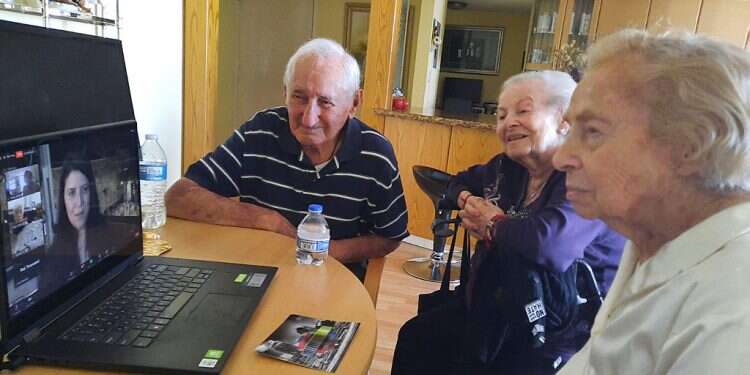As the world prepares to mark International Holocaust Remembrance Day on Thursday, the Holocaust Survivors' Rights Authority in the Social Justice Ministry published on Wednesday data about the number of survivors living in Israel.
Follow Israel Hayom on Facebook, Twitter, and Instagram
This past year, the authority and the ministry took steps to adapt the services they provide to survivors, given their advanced age and the effect of the COVID pandemic.
Currently, 165,800 Holocaust survivors and victims of antisemitic attacks during the Holocaust live in Israel, 90% of whom are 80 or older. The average age of survivors is 85. Some 31,000, or 19%, are over 90, and over 950 are over 100. This past year, 15,324 survivors died.
The figures from the Holocaust Survivors' Rights Authority indicate that 60% of the survivors known to the authority are women, whose average age stands at 85.4. Nearly two-thirds (64%) of known survivors were born in Europe. The largest group – 36%, or 59,900 were born in the former Soviet Union, followed by 19,100 born in Romania, 8,900 who were born in Poland, 4,500 who were born in Bulgaria, 2,400 who were born in Hungary, and 2,300 German-born survivors.
Another 36% of the known survivors in Israel were born in Asia and North Africa, including 30,600 Moroccan and Algerian-born citizens who suffered under antisemitism and antisemitic restrictions under the Vichy government. These include 18,000 Baghdad natives who were victimized by antisemitic rioting in Iraq in June 1941. Another 11,000 were born in Tunisia and Libya and were subjected to race laws and sent to labor camps.
Only 5% of known survivors in Israel made aliyah before the state of Israel was founded, while another 11% arrived by the end of 1948. Some 80,500 (48%) made aliyah by the end of the 1950s and over one-third made aliyah starting in 1989 in the big wave from the former Soviet Union. In 2021, an additional 98 survivors made aliyah.
Which cities in Israel are home to the most survivors? Haifa is number one, with 11,300 survivor residents, followed by Jerusalem (10,300), Tel Aviv (8,900), Ashdod (8,200), Netanya (8,000), Beersheba (7,050), Petah Tikva (6,700) and Rishon Lezion (6,500).
In 2021, the authority transferred some 4.1 billion shekels ($1.29 billion) in stipends and grants directly to survivors. A total of 50,800 survivors who lived through the camps and the ghettoes, lived under assumed identities or in hiding, worked in labor camps or were with their parents who worked as forced laborers, receive monthly stipends ranging from 2,554-6,412 shekels ($803-$2,017), based on their level of disability. Of these 15,500 low-income survivors receive monthly stipends of up to 11,729 shekels ($3,690). An additional 111,600 receive annual grants up 6,500 shekels ($2,044). A total of 3,400 survivors in Israel receive stipends from abroad have the amount topped up by the authority to the amount of 2,538 shekels ($798).
The Holocaust Survivors' Rights Authority also provides monthly stipends to some 18,000 widows and widowers of survivors.
Social Justice Minister Meirav Cohen said, "Our watch is the last watch, and it comes with great responsibility. The average age of Holocaust survivors is 85. These are the last years we have to serve them, allow them to age in dignity and also document as many of their stories as possible, because not long from now, there won't be anyone to tell them."
Subscribe to Israel Hayom's daily newsletter and never miss our top stories!




